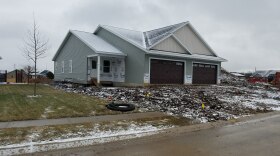In the long echoing hallway between the O’Hare parking ramp and the airport terminal, a busking violinist’s sweet melody amplified my hopeful mood, so I dropped a little bigger bill than usual into his instrument case, for the karma. Upstairs, our guest writer and I shook hands, two strangers squarely on a first-name basis, James and Ken. It slowly dawned on me that the two of us were launching into an old-fashioned American road trip, just like in the movies. Only we didn’t rob any banks.
We did, however, head right to dinner at a Chicago corner tavern with Christine and Doug, my sister and brother-in-law. The four of us shared not only an enthusiasm for a neighborhood meal washed down with a flavorful beverage but also concern about our two badly polarized homelands. Back at the apartment, Dignan, the big black Labrador, proposed to our visitor that the two of them become best friends for life.
The next morning, breakfast out and a visit to a regionally sourced grocery. As a farmer himself, James asked the butcher good questions about his work, and we learned about the satisfaction he felt practicing his craft there using more healthful and sustainable food sources. We thanked Christine and Doug and resumed our American road trip. The talk is a blur to me now but an hour later there was a small bag of donuts on the seat between us and we were telling each other about the last important conversation we had with our fathers before losing them not many years ago. That evening we visited probably the most notable family goat farm in our area. Amidst the warm hospitality I was blown away by the conversation between James, the sheep breeder, and Joe, the goat breeder. They locked eyes and took their shop talk pretty deep. I had never heard two farmers talk at such length about animal care and breeding, two smart, curious, caring experts who loved the hard, creative work of their herds. I left that evening admiring farmers more directly, based on the evidence of my own eyes and ears, than ever before.
The next day James spoke with students about activism and sustainability and then with a large auditorium of people about his farm in England and his writing. He was keenly interested in clues about local, small-scale creativity that can build a community and contribute to the changes needed in the wider society, including food and agricultural policy.
Next morning, our road trip resumed through Amish and other farm-scapes southeast of the city. I asked James to point out anything he noticed about the farms that I probably wouldn’t have spotted myself as a city boy. A mile or two further down the road, he pointed to a tidy farm with wide clean fields—no cover crop over the winter—and said this farm is struggling. They haven’t bought a new piece of machinery in twenty years. Their combine is a museum piece. A little later on, passing a farm with a white barn and wooden fencing brightly painted white, he said, this smaller farm looks like they’re doing better, they’re showing more pride in the look of their place.
These things were essentially invisible to me in my homeland. We sped on. The owner of an Amish quilt shop, completely at ease in herself, told us about the satisfaction and freedom of not having to earn the money to buy and maintain a computer. James and I spent the last hour listening to the edgy beats and lyrics of politically aware music from both his country and ours. Nina Simone’s song about Mississippi still so potent after all these years, and still so much work to be done in our country. I dropped James off in a struggling little city in western Ohio—big man-hug like we both meant it. I pointed the car back toward South Bend happy to understand that I know little about my own country and with a hopeful feeling that it’s not too late to learn. Plus admiration for people doing good work all around us and a renewed fondness for the restorative American tradition of making a road trip.
Music: Hungarian Dance No. 6 in D Flat Major, Vivace, WoO 1 (Brahms) Mela Tenenbaum (violin) and Anton Nel (piano)








